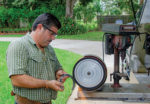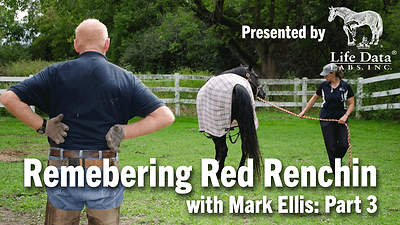Advertise Follow Us
American Farriers Journal

View Archived Issues
April 2014
Volume: 40
Edition: 3
American Farriers Journal is the “hands-on” magazine for professional farriers, equine veterinarians and horse care product and service buyers.
-
Table Of Contents
Table Of Contents
Shoeing For A LivingFarrier Guided by 'Classical Shoeing'
Horseshoer Alexi Gutierrez uses a solid base of footcare fundamentals to cover a wide range of horses in South FloridaRead MoreFocusing on ActivitiesDressage Hoof Care Presents Uncommon Challenges
Farriers need to be thorough to enjoy success in this complex disciplineRead MoreHoof CareDon't Forget the Basics When Shoeing Sport Horses
Avoid the traps of accessories by focusing on the needs of the athleteRead MoreBoost Profits With Boots
Modifying boots is a profit-building skill you should add to your footcare practiceRead MoreRed Flags for FarriersIs it Time to Toss that Tool?
Look for the signs that your implements are beyond repairRead MoreSupplements are One Piece of the Quality Hoof Puzzle
Seven out of 10 horses do not get a full serving of a fortified grain or complete feed, which may mean inadequate levels of key vitamins and minerals needed for hoof healthRead MoreBe a Part of the Calgary Stampede One Last Time
Build this sidebone shoe in the Calgary Mail-In Forging Exercise to mark the apparent end of the World Championship Blacksmiths Competition at the Calgary StampedeRead MoreHoof-Care Challenges Of Older Horses
With the large population of horses who serve as companion animals, there is a need for specialized footcare as these horses matureRead MoreDIY Hammer Handles Fit Farrier Well
South Carolina farrier Steve Prescott makes hammer handles from sections of hardware store oak trimRead More -
Featured Articles
Featured Articles
Shoeing For A LivingFarrier Guided by 'Classical Shoeing'
Horseshoer Alexi Gutierrez uses a solid base of footcare fundamentals to cover a wide range of horses in South FloridaRead MoreFocusing on ActivitiesDressage Hoof Care Presents Uncommon Challenges
Farriers need to be thorough to enjoy success in this complex disciplineRead MoreHoof CareDon't Forget the Basics When Shoeing Sport Horses
Avoid the traps of accessories by focusing on the needs of the athleteRead More











